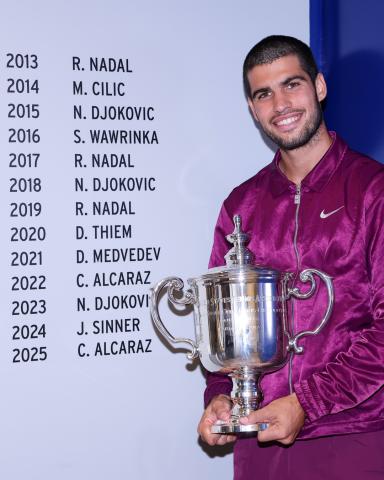
NEW YORK – The flash of a forehand winner. The impossibly delicate touch of a drop shot. The explosive celebration, a primal roar directed at his team. For the second time, Carlos Alcaraz has etched his name onto the US Open trophy, and the world saw the spectacular tennis that got him there. But the story of his 2025 victory isn’t just written in the stats of aces and winners; it’s written in the quiet moments of resilience, the weight of experience, and a matured understanding of what it truly takes to win.
When Carlos Alcaraz first exploded onto the scene, his game was a breathtaking whirlwind of youthful audacity. He won his first US Open in 2022 with the fearless energy of a prodigy who didn’t know what he couldn’t do. But the journey to his second was different. It wasn't about adding a new shot; it was about mastering the space between his ears.
This victory was forged in the fires of past battles. The painful losses, the periods of self-doubt, and the physical niggles that taught him a brutal lesson: talent alone is not a sustainable strategy. The man who stood on Arthur Ashe this year was not just a better player, but a more complete competitor.
The Art of Problem-Solving
Throughout the two weeks in New York, Alcaraz faced moments that would have broken a younger version of himself. A tricky opponent employing a frustratingly consistent game plan. A dip in his own energy levels. A set point against him that felt like a tidal shift.
In the past, frustration might have seeped in. This year, it was met with a steely calm. We saw him talk to himself, not in anger, but in focused conversation. We saw him step back, recalibrate, and find a solution. He won this title not just by overpowering everyone, but by outthinking them. He solved the complex puzzle each opponent presented, using his entire toolbox—patience, tactical serving, defense—not just his explosive power.
The Weight of the Crown (And How to Wear It)
After his first major, Alcaraz carried the world No. 1 ranking with a target on his back. Every player brought their absolute best against him, and he learned to absorb that pressure. This time around, he didn't just carry the weight; he used it to his advantage. He played with the aura of a champion who believed the court was his kingdom. Big points, tiebreaks, fifth sets—these are no longer moments to fear, but stages he expects to own. This deep-seated belief is a weapon no coach can teach; it is earned through triumph and hardship.
The Team: The Unseen Foundation
Behind every swing of Alcaraz’s racquet is the unwavering support of his team, led by coach Juan Carlos Ferrero. Their work was most visible in the physical transformation—a stronger, more durable athlete who could withstand the brutal two-week grind of a major. But their most critical work was mental.
They have built a fortress of focus around him, allowing him to block out the noise, the expectations, and the history at stake. In the player's box, their calm presence was a constant anchor amidst the storm of the match. They have helped mold a phenom into a professional, understanding that greatness is a marathon, not a sprint.
Carlos Alcaraz’s name is on the US Open trophy for a second time because he won the matches. But he won those matches because of the man he has become. He has learned to channel his electric energy with precision, to embrace struggle as a necessary part of victory, and to trust the process as much as his prodigious talent.
The first title announced a stunning talent. This second one confirms a champion’s mentality. The game has always been there. Now, so has everything else.
